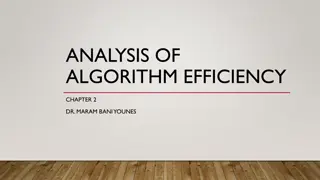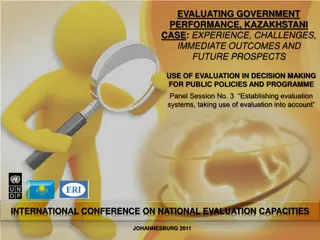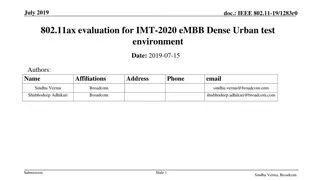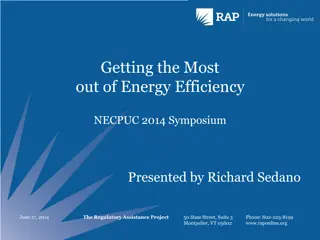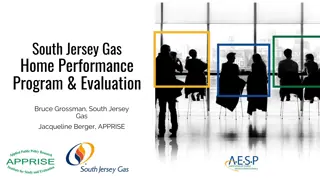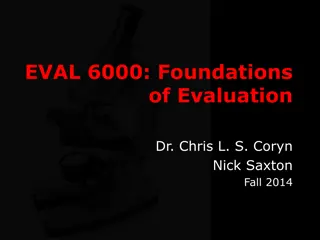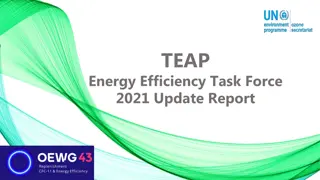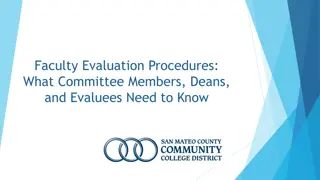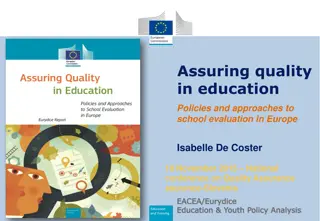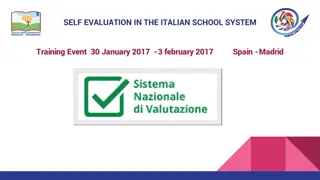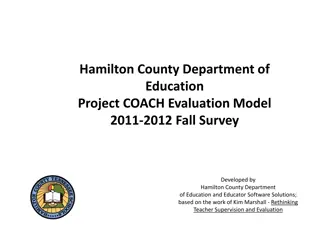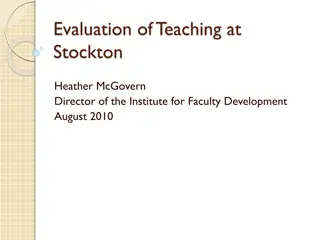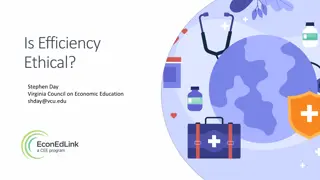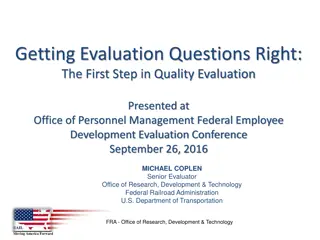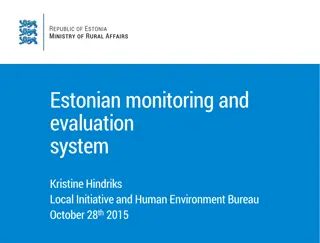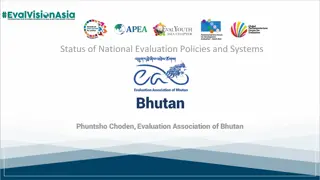Actions Emanating from the Evaluation of the Governance Reform
The evaluation of the governance reform within the WMO aimed to assess its alignment with strategic objectives, effectiveness in responding to societal needs, coordination efficiency, decision-making process, agility, and more. Evaluation criteria included relevance, design validity, effectiveness,
1 views • 13 slides
Comprehensive School Quality Assurance and Evaluation Process
A detailed insight into the Quality Assurance Department's role in school evaluation and improvement processes, including Whole School Evaluation (WSE), Follow-through initiatives, Teaching and Learning assessments, Resumption and Examination Monitoring. The process involves both internal self-evalu
0 views • 20 slides
Methods of Training Evaluation: Overview and Importance
Training and development are fast-growing fields globally, including in India. Evaluation plays a crucial role in understanding the effectiveness and efficiency of training programs for human resource development. This presentation covers the concept of training, evaluation strategies, methods/model
0 views • 61 slides
Universal Evaluation Framework: Simplifying Evaluation Processes
This session introduces the Universal Evaluation Framework (UEF) developed for evaluating QAA Scotland Enhancement Themes. Participants learn key evaluation questions, evidence capture, and the Theory of Change to enhance evaluation confidence. The QAA Scotland Evaluation Odyssey details historical
2 views • 14 slides
Implementing Blind Evaluation Pilot in HORIZON EUROPE: Key Facts and Process
HORIZON EUROPE is conducting a pilot on Blind Evaluation in the 2023-2024 work program to address biases in the research and innovation evaluation process. The pilot aims to assess the feasibility of blind evaluations in ensuring fairness and mitigating potential biases towards well-known organizati
9 views • 9 slides
Strengthening National Evaluation Capacity in the Era of Sustainable Development Goals
The presentation by Vijayalakshmi Vadivelu at the National Evaluation Capacities Conference 2017 in Istanbul focused on the importance of strengthening national evaluation capacity in alignment with the Sustainable Development Goals (SDGs). The content covers the holistic approach to national evalua
3 views • 18 slides
Understanding Algorithm Efficiency Analysis
In this chapter, Dr. Maram Bani Younes delves into the analysis of algorithm efficiency, focusing on aspects such as order of growth, best case scenarios, and empirical analysis of time efficiency. The dimensions of generality, simplicity, time efficiency, and space efficiency are explored, with a d
1 views • 28 slides
Exploring Developmental Evaluation for Better Decision-Making
Delve into the realm of developmental evaluation, focusing on its purpose, principles, and application in practice. Understand how developmental evaluation emphasizes real-time data collection for informed decision-making in complex systems. Learn about key principles such as developmental purpose,
0 views • 25 slides
Enhancing Government Performance Through Evaluation: The Kazakhstani Experience
Explore the journey of administrative reform in Kazakhstan initiated in 2006 to enhance government effectiveness. The ongoing evaluation system assesses six key areas, aiming to improve public service quality, state planning, and more. Key aspects include setting evaluation criteria, assessing insti
2 views • 18 slides
Evaluation Practices in Macedonia: What Works, What Doesn't
The comparison between the effectiveness of evaluation practices and the presence of formal institutions in Macedonia raises questions about the impact of institutional design on outcomes. While some countries with robust evaluation institutions fall short in practice, others lacking such structures
1 views • 7 slides
Enhancing Evaluation Capabilities in Mongolia for Agenda 2030
The Mongolian Evaluation Network in collaboration with UNDP is working to integrate the 2030 Agenda into national strategies and plans, establish institutional coordination mechanisms, align budgets, and enhance data monitoring systems. Key stakeholders including government agencies, NGOs, and inter
0 views • 9 slides
Understanding Demi-Regularity in Realist Evaluation
Realist Evaluation is a theory-driven approach focusing on understanding the context and mechanisms of action behind policies and interventions. This webinar explores the concept of demi-regularity in realist evaluation, its origins, and its application in analyzing complex evidence. Key aspects cov
1 views • 16 slides
Evaluation of IEEE 802.11ax for IMT-2020 eMBB Dense Urban Test Environment
This document discusses the evaluation of IEEE 802.11ax technology in the context of the IMT-2020 Enhanced Mobile Broadband (eMBB) Dense Urban test environment. It analyzes the performance of 802.11ax in meeting the key PHY/MAC metrics required for eMBB Dense Urban scenarios, such as Peak Spectral E
2 views • 13 slides
Understanding Evaluation in Education
Evaluation in education is a comprehensive term that encompasses measurement, testing, and qualitative examination of student behavior. It involves both quantitative and qualitative descriptions, along with value judgments. Differentiating from mere measurement, evaluation provides a deeper analysis
0 views • 28 slides
Sustainable Evaluation Systems Workshop Summary
Workshop on Sustainable Evaluation Systems by Stephen Porter at the NEC Conference focused on defining evaluation systems, addressing their failures, and emphasizing the importance of quality, use, and networks in achieving sustainability. Participants engaged in activities such as bingo card introd
0 views • 38 slides
Strategic Management: Strategy Review and Evaluation
This chapter delves into the critical process of strategy review, evaluation, and control in strategic management. It covers the nature of strategy evaluation, effective evaluation systems, contingency planning, auditing, using computers for evaluation, and guidelines for effective strategic managem
1 views • 42 slides
Understanding Evaluation and Ideology in Translation
Evaluation plays a crucial role in the study of translation, influencing both meaning and value in communication. This evaluation is reflected through language elements like accentuation, deletion, and substitution. Appraisal, stance, and evaluation are key terms in linguistic analysis that focus on
2 views • 22 slides
Impact and Evaluation Toolkit for Churches and Christian Charities
This toolkit aims to equip churches and Christian charities engaged in small-scale social action projects to think about impact, measure impact, choose data tools, reflect on evaluation data, and use it effectively. It covers principles of evaluation, setting objectives, selecting indicators, storyt
0 views • 34 slides
Evaluation Metrics for IEEE 802.11-14/0107 HEW Proposal
Evaluation metrics play a crucial role in assessing WLAN system performance and achieving the objectives of High Efficiency WLAN (HEW). This proposal by Yonggang Fang et al. from ZTE outlines the key evaluation metrics recommended for evaluating HEW performance, including area throughput, average th
0 views • 12 slides
Overview of Monitoring and Evaluation in the GEF
The Evaluation in the GEF and Training Module focuses on promoting accountability and learning within the Global Environment Facility (GEF) through monitoring and evaluation activities. The GEF Independent Evaluation Office plays a crucial role in assessing results, effectiveness, and performance of
0 views • 25 slides
Chile Country Portfolio Evaluation 2010-2014 Summary
Evaluation process of Chile's country portfolio from 2010-2014 included pre-evaluation, during evaluation, and results/conclusions phases. Challenges like defining scope and participant concerns were addressed. Preliminary conclusions were presented to stakeholders, leading to a trustful and represe
1 views • 6 slides
Potential Amendments for Reforming REACH Evaluation Process
Discussion at the Ad-hoc Meeting of Competent Authorities for REACH and CLP focused on potential options for amending the REACH Regulation to reform the evaluation process. Topics included registration-related measures, substance evaluation, testing proposals, compliance checks, and expectations dur
0 views • 30 slides
Developing an Evaluation Work Plan for Effective Program Assessment
This presentation by Amy D. Andrade from San Jose State University focuses on developing an Evaluation Work Plan to identify responsibilities and timelines. It covers topics such as Evaluation Coaching Support, Webinar Outlines, Logic Model, Inputs-Outputs-Outcomes, Two Approaches to Evaluation, Pro
0 views • 29 slides
Enhancing Energy Efficiency for Sustainable Development
This content covers a symposium on maximizing energy efficiency, presented by Richard Sedano at the NECPUC 2014 event. It introduces the Regulatory Assistance Project (RAP), a non-profit organization aiding government officials in energy and environmental issues with a focus on cost-effective energy
1 views • 27 slides
South Jersey Gas Home Performance Program Evaluation Overview
Overview of South Jersey Gas's Home Performance Program presented at the AESP National Conference #AESP18. The program includes energy efficiency initiatives, evaluation findings, regulatory approach, goals, marketing strategies, and evaluation methods. Focus on increasing energy efficiency opportun
0 views • 16 slides
Foundations of Evaluation - Conference Experience and Approaches
The Foundations of Evaluation course covers diverse topics such as improvement- and accountability-oriented evaluation approaches, social agenda evaluation, and eclectic approaches. The course material includes insights on decision- and accountability-oriented studies, methods for program improvemen
0 views • 29 slides
Addressing Energy Efficiency in Cooling Sector: 2021 Report Highlights
The 2021 update report from the TEAP Energy Efficiency Task Force emphasizes the critical nature of the climate emergency and the need to transition to lower GWP refrigerants and higher efficiency cooling systems. The report focuses on initiatives to enhance the efficiency of room ACs and refrigerat
0 views • 44 slides
Evaluation Synthesis in Changing Contexts: Enhancing Knowledge for Development Effectiveness
Evaluation synthesis is crucial for promoting learning, reflection, and decision-making in development work. This process involves bringing together diverse knowledge sources to generate strategic insights and facilitate wider use of evaluation findings. The Independent Office of Evaluation of IFAD
0 views • 20 slides
Evaluation of FME Zero Emission Neighbourhoods in Smart Cities
The mid-term evaluation process of FME Zero Emission Neighbourhoods in Smart Cities involves self-evaluation, partner evaluation, and panel evaluation. The procedure includes scientific review, evaluation by scholars, and innovation assessment. Key documents like self-reports, progress reports, and
1 views • 20 slides
Overview of Regular Evaluation 2017 Findings in Estonia
In the Regular Evaluation 2017, efforts were made to maximize the benefits of evaluation outcomes for various stakeholders in Estonia such as the state, society, and institutions. The evaluation focused on a range of actions including preparing legislation, finding experts, creating self-report form
0 views • 6 slides
Faculty Evaluation Procedures: Committee Structures and Purpose Overview
This slide deck provides information on faculty evaluation procedures, emphasizing the purpose of the evaluation process in supporting faculty development, ensuring student access to quality education, and upholding academic freedom. It also details the committee structures for comprehensive tenured
0 views • 19 slides
Comprehensive Guide to Training Evaluation Methods
This detailed guide covers the aim of evaluation, evaluation methods, techniques of evaluation, types of evaluation (formative, process, outcome, impact), and the significance of formative and process evaluation in assessing training effectiveness. Learn about the key principles and practices involv
0 views • 45 slides
Ensuring Quality in Education: School Evaluation in Europe
Explore the policies and approaches to school evaluation in Europe with a focus on external and internal evaluation methods, quality assurance approaches, and recommendations from the European Parliament and Council. Discover insights on the purpose and evolution of school evaluation, emphasizing th
0 views • 23 slides
Evaluation System in Italian Schools: A Comprehensive Overview
Italy's school evaluation system has recently been established to improve educational quality and provide necessary support. The process involves self-evaluation, improvement actions, external evaluation, and reporting of results. Data from Ministry of Education and INVALSI are utilized, leading to
0 views • 23 slides
Evaluation Model for Teacher Supervision and Feedback in Education
Evaluation model conducted by Hamilton County Department of Education in collaboration with Educator Software Solutions, based on Kim Marshall's work on rethinking teacher supervision and evaluation. The evaluation covers aspects like grade levels served, positions held by educators, goal setting co
0 views • 18 slides
Evaluation of Teaching at Stockton: Methods and Recommendations
This document provides insights into the evaluation of teaching practices at Stockton University, focusing on multiple assessment methods such as self-evaluation, student evaluations, peer observations, and building teaching portfolios. It outlines steps for faculty to follow, including selecting ob
0 views • 77 slides
Exploring the Ethics of Efficiency in Economics Education
Delve into the intriguing discussion on whether efficiency is ethical in the realms of economics and education. This session, featuring the new Ethics, Economics, and Social Issues curriculum through EconEdLink, analyzes the concept of efficiency through diverse examples and engages participants in
0 views • 26 slides
Understanding Evaluation Questions for Quality Assessment in Federal Programs
Presentation by Michael Coplen at the Office of Personnel Management Federal Employee Development Evaluation Conference focused on the importance of developing quality evaluation questions, common flaws, and driving actionable evaluation by using evidence and rigorous criteria. The session highlight
0 views • 35 slides
Estonian Monitoring and Evaluation System Overview
Estonian Monitoring and Evaluation System involves elements like Evaluation Plan, Ex-ante and Ex-post evaluation, compulsory indicators, and regulations for data collection. It outlines the responsibilities of Managing Authorities and LAGs in planning and conducting evaluation activities. The system
0 views • 20 slides
Evaluation Landscape in Bhutan: Policies, Systems, and Capacities
Bhutan has institutional arrangements for evaluation led by the Royal Audit Authority and a Research and Evaluation Division in the GNHC. The VOPE engages government officials, CSOs, and the private sector in evaluation activities. Partnerships are fostered through the Evaluation Association of Bhut
0 views • 5 slides






